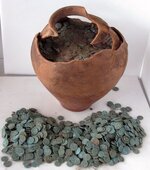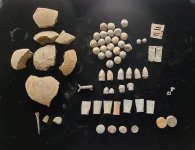Satori
Full Member
Buried Treasure Fills in Ancient Roman Puzzle
By Michael Torrice
ScienceNOW Daily News
5 October 2009
As civil wars erupted throughout the Roman Republic in the 1st century B.C.E., country dwellers may have fled to cities. Before they left, some people buried their valuables to hide them from looting armies. Now social scientists have studied these ancient stashes, called coin hoards, to answer a long-standing Roman mystery.
Historians have long debated Rome's population size during the 1st century B.C.E., a time that marked the assassination of Julius Caesar and the fall of the Roman Republic. Starting in 28 B.C.E., censuses conducted under the first Roman emperor, Augustus, pegged the population of the Italian peninsula at about 5 million--a 10-fold increase over that of the Roman Republic a century earlier. About a third of this jump can be explained by the extension of citizenship to Roman allies across Italy. But where did the rest of the people come from?
Some historians say the answer is simply population explosion. Others say the population didn't increase--and that, in fact, the century's civil wars actually thinned the empire's ranks. Instead, they argue that the empire included women and children in its census, whereas the republic only counted adult males.
To settle the debate, social scientist Peter Turchin of the University of Connecticut, Storrs, and his colleague Walter Scheidel of Stanford University in Palo Alto, California, turned to coin hoards. Amateur antiquities hunters armed with metal detectors have found hundreds of clay pots filled with silver coins, called denarii, throughout Italy dating back to the Roman Empire. Turchin says these buried treasures can be used as a proxy for times of social instability. People would hide their money during dangerous times, and if they were killed or displaced by war, they never reclaimed their loot.
Turchin and Scheidel combined numbers of coin hoards from 250 B.C.E. to 100 B.C.E. with data from the Roman Republic censuses to understand how spikes in stashes reflected population changes. For example, population dropped by about 50,000 during the Second Punic War from 218 B.C.E. to 201 B.C.E., and that coincides with a jump in coin hoards dated to that time. Then, from data on coins hoarded from 100 B.C.E. to 50 C.E., the researchers inferred population during that era. The range predicted by the coin hoard model is about half that of the high estimate, indicating that civil wars culled about 100,000 people from the Roman populace, the researchers report online today in the Proceedings of the National Academy of Sciences. "We know this period was extremely violent with internal warfare across Italy," says Turchin. In all, the findings bolster the hypothesis that the Augustan censuses were not confined to adult men.
"This paper has the great virtue of pushing the debate back toward actual evidence," says historian Ian Morris of Stanford University. But historian J. Geoffrey Kron of the University of Victoria in Canada, a proponent of the population-explosion hypothesis, believes that it's a stretch to connect increased coin hoarding with more deaths and that some people may have hid money from confiscation by political opponents. He points out that one of the 1st century B.C.E. coin-hoard spikes coincides with a civil war that didn't cause high casualties. "Increased coin hoards only represent evidence of fears of violence," Kron says. "These fears may or may not have been justified by actual events."
By Michael Torrice
ScienceNOW Daily News
5 October 2009
As civil wars erupted throughout the Roman Republic in the 1st century B.C.E., country dwellers may have fled to cities. Before they left, some people buried their valuables to hide them from looting armies. Now social scientists have studied these ancient stashes, called coin hoards, to answer a long-standing Roman mystery.
Historians have long debated Rome's population size during the 1st century B.C.E., a time that marked the assassination of Julius Caesar and the fall of the Roman Republic. Starting in 28 B.C.E., censuses conducted under the first Roman emperor, Augustus, pegged the population of the Italian peninsula at about 5 million--a 10-fold increase over that of the Roman Republic a century earlier. About a third of this jump can be explained by the extension of citizenship to Roman allies across Italy. But where did the rest of the people come from?
Some historians say the answer is simply population explosion. Others say the population didn't increase--and that, in fact, the century's civil wars actually thinned the empire's ranks. Instead, they argue that the empire included women and children in its census, whereas the republic only counted adult males.
To settle the debate, social scientist Peter Turchin of the University of Connecticut, Storrs, and his colleague Walter Scheidel of Stanford University in Palo Alto, California, turned to coin hoards. Amateur antiquities hunters armed with metal detectors have found hundreds of clay pots filled with silver coins, called denarii, throughout Italy dating back to the Roman Empire. Turchin says these buried treasures can be used as a proxy for times of social instability. People would hide their money during dangerous times, and if they were killed or displaced by war, they never reclaimed their loot.
Turchin and Scheidel combined numbers of coin hoards from 250 B.C.E. to 100 B.C.E. with data from the Roman Republic censuses to understand how spikes in stashes reflected population changes. For example, population dropped by about 50,000 during the Second Punic War from 218 B.C.E. to 201 B.C.E., and that coincides with a jump in coin hoards dated to that time. Then, from data on coins hoarded from 100 B.C.E. to 50 C.E., the researchers inferred population during that era. The range predicted by the coin hoard model is about half that of the high estimate, indicating that civil wars culled about 100,000 people from the Roman populace, the researchers report online today in the Proceedings of the National Academy of Sciences. "We know this period was extremely violent with internal warfare across Italy," says Turchin. In all, the findings bolster the hypothesis that the Augustan censuses were not confined to adult men.
"This paper has the great virtue of pushing the debate back toward actual evidence," says historian Ian Morris of Stanford University. But historian J. Geoffrey Kron of the University of Victoria in Canada, a proponent of the population-explosion hypothesis, believes that it's a stretch to connect increased coin hoarding with more deaths and that some people may have hid money from confiscation by political opponents. He points out that one of the 1st century B.C.E. coin-hoard spikes coincides with a civil war that didn't cause high casualties. "Increased coin hoards only represent evidence of fears of violence," Kron says. "These fears may or may not have been justified by actual events."






